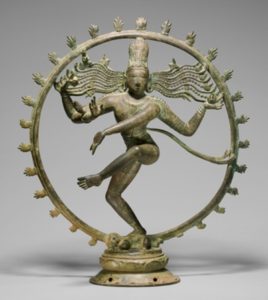 Where I live, in San Francisco, the sky is roaring with war planes.
Where I live, in San Francisco, the sky is roaring with war planes.
Fleet Week is upon us. Every year, tourists come into town to watch the magnificent men in their lethal flying machines. An air force tradition from the days when American superpowerdom was undisputed, the show seems to recall a simpler time, when war was — I don’t know — fun?
Maybe military recruiters pass out little American flags for people to wave, like the ones that unaccountably appeared in the hands of bystanders when the Saddam Hussein statue was pulled down.
Air warrior

Matching this symbolism to a tee is the current transit of Mars (war) in Gemini (air), which is raking back & forth over the country’s natal Mars as part of a long retrograde. It’s a super-sized Mars Return, giving us a good look at Uncle Sam’s natal Mars-Neptune square,(1) suggestive of the relationship between nationalism and militarism.
The role of Mars (assertion or aggression, depending on how it is used) in the context of war is well-known. The role of Neptune is less obvious. But it is the real driver here.
 Neptune represents the human yearning to be part of something big and meaningful (mass sentiment, cults, myth). (2) When integrated, it is sublime, euphoric. When unintegrated it can make the most preposterous frauds seem not only acceptable, but the whole point of living.
Neptune represents the human yearning to be part of something big and meaningful (mass sentiment, cults, myth). (2) When integrated, it is sublime, euphoric. When unintegrated it can make the most preposterous frauds seem not only acceptable, but the whole point of living.
Patriotic pride, intellectually vague yet emotionally vaulting, stems from our longing to be a member of a great in-crowd: to live in a country that’s divinely appointed and morally sui generis.
Flag pins
Historically, nationalism has always been a lowest-common-denominator bonding device. For centuries it has corralled the masses into allegiant manageability.
corralled the masses into allegiant manageability.
Even in the modern globalized world, pride-in-country is supposed to signify that a person has depth and character. Politicians everywhere deploy its sound bites to lend a moral gloss to ego-driven ambitions.
Congressmen still wear flag pins as part of their uniform. Latter-day Mussolinis rouse voters by naming their party “Brothers of Italy.” British citizens queue up in the thousands for a royal funeral, and buy commemorative tea towels when a princeling is born.
But everybody knows countries aren’t the big deal they once were.

Stateless empires
Empires now rise and fall in boardrooms. Their territories reside in cyberspace. Power no longer lies with kingdoms or republics, but with multinational corporations and a smattering of libertarian-leaning billionaires.
The great issues of our day do not hinge on this or that type of government. Pundits continue to belabor the great dictatorship-vs.-democracy question, but these debates sidestep our more profound crises, which operate on a planetary scale.
In a world at risk of mass extinction,  God-and-country imagery feels more than a little anachronistic.
God-and-country imagery feels more than a little anachronistic.
Not that the cult of nationalism is fading gracefully — quite the opposite. The rage-fueled sentimentality of mob populism is more robust than ever.
Imagine
Yet a vision of a world without countries is at least as eternal, and universal. Idealists from every era have nurtured this dream.
Imagine there’s no countries… I wonder if you can. – John Lennon
Before Lennon there was Lenin. As we know, the soviet attempt to transcend nationalism didn’t work out too well. Maybe they were just too official about it, explicitly writing it into their ideology and all.
The capitalist approach, by contrast, is more covert. Like communism, it has no use for  national boundaries, but not because it has a utopian agenda. Capitalism is an amoral construct. Based on growth at all costs, it is global by implication.
national boundaries, but not because it has a utopian agenda. Capitalism is an amoral construct. Based on growth at all costs, it is global by implication.
We now live in a mostly urban, digitally interconnected and economically globalized world. Environmental crises, too, are undermining the age-old connection between the idea of where-I-live and the idea of who-I-am. Climate refugees, whose numbers will swell exponentially in the years ahead, are among the world’s poorest denizens.
Yet the super-rich, too, are increasingly cut off from a sense of place. Worldly power is becoming uprooted. We don’t need to know what country Murdoch, Zuckerberg and Musk were born in. We easily understand their historic meaning without knowing what passports they hold.
Stateless war
Still, as long as different countries exist, captains of industry will continue to make use of them. In the corporate mind, the existence of national distinctions continue to serve certain purposes: trade laws, workforces, millions of untapped consumers.
Companies like Lockheed, Raytheon and Boeing – so defiled and deplored by anti-war demonstrators back in the day –– are still at it. Indeed, the whole munitions industry has expanded into a wildly successful network of contracting subsidiaries, making “defense” a more profitable field than ever before.
(I propose we go back to calling the Defense Department the War Department, from which original name it was rebranded in 1947. Probably by the same PR agency that came up with “Blue Angels” for screaming fighter jets.)
During the 1960s, Vietnam pushed the Pentagon budget into the news, where it shocked and appalled the public. Since then, however, Americans don’t seem terribly bothered by it, despite the fact that the numbers are even worse now. At 800+ billion dollars, the military budget amounts to more than that of the next nine countries combined.
 As Bill Maher reminds us, that figure is twice what it was in 2003. That was two wars ago, right? So wouldn’t it be logical to be shelling out a whole lot less, not twice as much, to the armaments makers? (3)
As Bill Maher reminds us, that figure is twice what it was in 2003. That was two wars ago, right? So wouldn’t it be logical to be shelling out a whole lot less, not twice as much, to the armaments makers? (3)
Barely a whimper
It isn’t surprising how few public officials quibble about these ghastly expenditures. They know that even a peep of protest would be career suicide. What is more curious is why so few ordinary people think about them.
In every other context, the American mind prides itself on a meat-&-potatoes commonsense. How we howl about the cost of shrink-flationary toilet paper! How we rage against being preyed upon by profiteering drugmakers and ride services! Yet we voice barely a whimper of objection to Big Armaments.
by profiteering drugmakers and ride services! Yet we voice barely a whimper of objection to Big Armaments.
It isn’t because people don’t know about the corruption involved. Most Americans have doubtless heard about, and agree about, the astronomical price gouging, the lobbyists, the bought-and-sold politicians.
So whence our complacency?
Planet of secrets
For violations of rationality this grotesque, astrologers suspect the involvement of the outer planets. One of them is Pluto (taboo), which opposes Mercury in the US chart. This placement helps us understand why, in the public discussion, the very thought of giving the masters of war one penny less than they ask for feels like a blasphemy.
Pluto operates in the dark. It governs subject matter which, were it subject to the light of consciousness, wouldn’t stand up to curiosity, moral debate, or the rock-bottom minimum of pragmatism it would take to comparison-shop at Costco.
Good guys
For middle-class Americans, brought up to see ourselves as the global good guys, perhaps there’s just too much moral dissonance between our principles — usually reserved for  manageable questions, like whether to allow a homeless shelter in our neighborhood — and the fact that we are paying, year after year, for offshore prisons where torture takes place.
manageable questions, like whether to allow a homeless shelter in our neighborhood — and the fact that we are paying, year after year, for offshore prisons where torture takes place.
Because we can’t bridge the conceptual gap between one type of inhumanity and the other, we ignore the one with greater scope.
Democracy Daddy
But the USA is in its Pluto Return, and our moral credibility gap is getting hard to ignore.
Before this cynical age, schoolchildren were taught that whatever America does makes the world a better place. However, in recent years, Uncle Sam’s reputation has segued from Benevolent Democracy Daddy to nationwide shit storm, and the propagandists have wisely decided they’d better soft-pedal the whole nation-building shining-city-on-a-hill thing.
Instead, we hear think tank economists soberly insisting that the war economy works financially.
The idea that war economy brings prosperity has become … an American illusion…. converted into an ideology… Seymour Melman The Permanent War Economy: American Capitalism in Decline
Neptune
The practicality rationale is laughable if you think about it for more than two seconds. To sell people on an idea as absurd as this — that causing destruction and suffering is a wise use of resources — you need to pull out the big guns of persuasion. You need to appeal to the planet of illusion.
It is Neptune that governs fads, fantasies and scams, whose power over the group mind defies rational explanation: Ivermectin, the Kardashians, war fever.
power over the group mind defies rational explanation: Ivermectin, the Kardashians, war fever.
Like Pluto, Neptune makes mincemeat out of the earnest impulses of the conscious planets. Mercury may say, “This doesn’t make sense;” Jupiter may say, “This goes against what I believe;” and Mars may protest, “This goes against my interests.” But Neptune just smiles gently and keeps weaving its web.
As Eckhert Tolle would say, “This is normal, and it is insane.”
Mystique
As a thought experiment, we might consider what would happen to nationalism if we could surgically remove the patriotic mystique.
We wouldn’t have to get rid of the idea of countries altogether. We could keep harmless stereotypes like French berets, Mexican quinceaneras and Dutch chocolate. We could even keep national borders, a workable construct for identifying big groups of people.
We’d just  take away the fantasy that another country’s people are fundamentally different and harmful and should be attacked.
take away the fantasy that another country’s people are fundamentally different and harmful and should be attacked.
Freed from Neptune’s spell, the other parts of our psyche, symbolized by the personal planets, would finally get to weigh in.
I suspect Venus (aesthetics) wouldn’t have any trouble at all withdrawing her affection for war, now that fighting bayonet-to-bayonet, in fabulous red breeches, has segued into the grey banality of remote targeting by drone.
Absent Neptunian illusion, Mercury (logic) would laugh the notion of My-country-right-or-wrong out of town. The Moon and Saturn (security) would get to decide whether the military-industrial complex was really making us safe.
A fully operative Jupiter (ethics) would find it contemptible to condone inhumane policies because we identify with this or that landmass. The justification would be gone for governments undermining other governments, imprisoning critics, and killing young men all over the world who they deem threatening to “national interests.”
As for Mars, its first order of business would be to call for a rigorous definition of that notorious phrase, “national interests.” Then citizens could decide whose interests were really being referred to.
War porn
If we demystified nationalism, would Americans still love Marvel movies?
The military has long taken advantage of the manipulative magic of Hollywood. It has collaborated with the creators of MCU films ever since Captain America. Our latest fist-pumping blockbuster, “Top Gun Maverick,” is a two-hour propaganda ad for defense contractors.
When it screened in Cannes “Top Gun” was promoted with actual fighter jets, hired to careen over the heads of the glitterati in attendance.
Isn’t it odd, that here, in the most hyper-woke cultural moment in history, the war-as-entertainment industry remains beyond reproach? While a veritable storm of criticism is aimed at Hollywood for its offenses in every other arena — gender identity, race, disability, you name it – audiences across the political spectrum remain enthralled with lil’ Tommy Cruise and his glistening aircraft carriers.
Its violence aside, the US military is also an ecological travesty, of course. It’s a bigger polluter than as many as 140 countries. Its fuel usage alone makes it the 47th largest emitter of greenhouse gases in the world.
Spooking the News
It’s pretty clear the war industry could not maintain this moral immunity were it not in bed with the national media, which maintains an unbreakable omertà when it comes to dissing the military.
Whether a network is considered “liberal” or “conservative” doesn’t make a speck of difference. Whether the reigning administration is Dem or GOP matters not one whit. Partisan battles may squawk away in the foreground, while this taboo hums along in the background. The corporate media’s lips are sealed.
The CIA has a long history of spooking the news, dating back to its earliest days when the legendary spymaster Allen Dulles and his top staff drank and dined regularly with the press elite of New York and Washington. – Nicholas Schou
Outside of the work of a handful of true journalists and a few brave outlier publications, all coverage cleaves to the first rule of American journalism: Not a word — until a respectful  couple of decades has passed — about how our government instigates coups and meddles in elections around the world (see my essay on Ukraine). Don’t mention the special ops programs in Somalia, Kenya, Syria, Yemen, etc. Stay mum about the USA being the biggest arms dealer in the world.(4)
couple of decades has passed — about how our government instigates coups and meddles in elections around the world (see my essay on Ukraine). Don’t mention the special ops programs in Somalia, Kenya, Syria, Yemen, etc. Stay mum about the USA being the biggest arms dealer in the world.(4)
Patriotism by proxy
In recent years, shifting global trends have forced the war machine to tweak its approach. The new mode is slippery stateless and proxy wars.
The new conflicts are indirect and under-publicized. This way, the generals must don’t have to worry about students marching in the streets; proxy wars tend not to trigger the pesky moral compunctions aroused by the traditional kind. The logic seems to be that if they are undeclared and undiscussed, they must not be real wars.
The key to the strategy is to find a committed local partner — a proxy willing to do the killing and dying — and then load it up with arms, money and intelligence. – Hal Brands
With Ukraine, for example, armaments have been flowing non-stop. An outdated Russophobia left over from the Cold War has been pressed into service. Despite the fact that anti-Communism doesn’t work anymore as a rationale for our fear-and-loathing of Russia – goddess knows, Putin has given us more than enough new reasons – it was an easy vein for the warmongers to mine.
But on an energy level, the public’s response to Putin’s invasion – an almost unilateral pro-Ukraine frenzy — has little to do with ideology. The buzz of old-fashioned patriotism has pulled us leaping into the fray.
leaping into the fray.
This is despite the fact that the cause we’re rooting for comes with dubious political baggage of which most Americans are probably completely ignorant, especially the part about the CIA. (5) It matters little that many of us do not know what NATO is, let alone what it does. NATO is being presented as the team we are on.
But a powerful global alliance like NATO, Putin’s true antagonist, doesn’t quite fit as an underdog. So for that role, the West has cast the appealing young Zelenskyy.
With the players thus established, the Neptunian narrative is set. We are exhorted by government, celebrities, and Facebook friends to prove our moral fiber by supporting the shipment of more, more, more guns and missiles to Ukraine.
Ukraine, like Afghanistan, will bleed for a very long time. —Chris Hedges
Keeping it real
Throughout history, the pumping of national treasure into killing and ruination has always been morally ludicrous. But right now, with the abomination of nuclear weaponry (this time Putin’s) rearing its head against a background of ecocidal catastrophe, the ludicrousness of war is on a whole other scale.
Let us accept this. Looking at the  situation square in the eye is the first step towards a solution. Not that we can undertake, alone, the demystification of our society or our world. It is a great, messy, agonizingly slow collective process.
situation square in the eye is the first step towards a solution. Not that we can undertake, alone, the demystification of our society or our world. It is a great, messy, agonizingly slow collective process.
But we can undertake de-mystification on ourselves. This happens naturally when we identify with our highest instincts. These instincts know what’s true and what’s not. They know the difference between an idea that comes from fear and one that comes from wisdom. Just as our bodies know how to heal a wound, our psychic instincts know the difference between toxicity and sanity.
The viral pandemic clarified the need for such distinctions. Blowing into town with the historic transits of 2020, Covid tasked us with distancing ourselves from group contagion, as far as was practical, while not denying that we were somehow part of it. The crisis augured a newly urgent need to protect ourselves from toxicity, including the psychopathologies of the society we live in, while remaining self-aware and heart-engaged.
in, while remaining self-aware and heart-engaged.
The chaos around us is increasing, and requires a firmer-than-usual commitment to getting and staying centered. We all have the inner equipment to do this.
This equipment is mapped out by the birth chart. Astrology proposes that each of us is a unique embodiment of universal Source, plopped down from the ethers into a specific spatial and temporal point in the human story.
Not that we need astrology to connect with the meaning of our life. Each of us has our own way of listening to the wiser part of ourselves.
Whatever means we use to get there, when we’re centered we’re not only safer from outside harm but far more able to contribute in a healthy way to the wider world.
Notes
- 1 This is a natal signature – it’s there all the time — but through April 2023 we’re getting an especially look at it. Mars in Gemini is raking back & forth over those natal degrees, provoking transiting Neptune in Pisces, which has been hovering for years in the background, forming a mutable cross. The transit is a global phenomenon that has particular relevance for the USA. It’s working on us individually, showing us how we’re undermined by mesmerizing influences
- 2 In an individual’s chart, the ego (Mars) longs to lose itself in big, meaningful visions. There is a webinar on these combinations here.
- 3 Consider the 1.5 trillion dollars the Pentagon spent on the F-35 fighter jet, a super-duper mass killing machine which, just incidentally, doesn’t work. But which we — we, as in US taxpayers — keep on buying, presumably because of the “contract” in “defense contract.” The fact that most of these diabolic instruments won’t ever be used, thank goddess, ironically adds insult to injury from a practical point of view. They’re designed to sit and rust in hangars somewhere, not only a humanitarian atrocity but a colossal waste of money.
- 4 For the five years from 2017 to 2021, the U.S. accounted for 39 percent of major arms deliveries worldwide, over twice what Russia transferred and nearly 10 times what China sent to its weapons clients. — Forbes
- 5 According to a CBS documentary that was censored and never shown, only 30 percent of arms shipped to Ukraine make it to the front lines, with the rest siphoned off to the black market. There is no oversight of weapons once they arrive in Ukraine, long considered the most corrupt country in Europe.
Images:
The Song of the Lark, Jules Adolphe Breton
Saint George and the Dragon, Bernat Martorell
Shiva as Lord of the Dance, 10th/11th century
Houses of Parliament, Claude Monet
The Great Wave, Katsushika Hokusai
Jesus Mocked by the Soldiers, Édouard Manet
Fishing Boats with Hucksters, Joseph Mallord William Turner
After the Hurricane, Winslow Homer
The Battle between the Gods and the Giants, Joachim Antonisz. Wtewael
Tom Cruise Image by Vecteezy
Boattail, CC BY-SA 3.0, via Wikimedia Commons
.RGB., CC BY 2.0, via Wikimedia Commons


